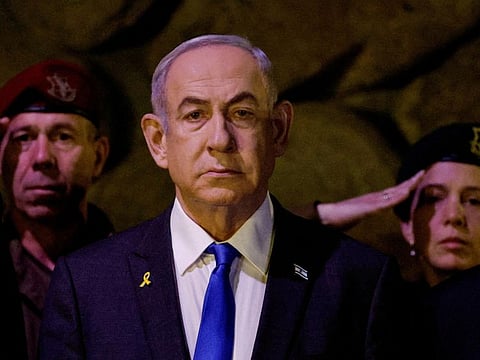Gaza truce plan leaves Netanyahu in political bind
Analysts say it is too soon to entirely write off the veteran political survivor

JERUSALEM: Israeli Prime Minister Benjamin Netanyahu is under huge international pressure to move ahead with a ceasefire and hostage release deal for Gaza but opposition within his hard-right coalition means it might come at a political price.
Far-right coalition partners have threatened to quit over the outline deal presented by US President Joe Biden on Friday, potentially leaving Netanyahu at the mercy of centrist parties that are likely to seize the first opportunity to remove him from office.
But analysts told AFP that in a society still traumatised by the October 7 attack, it is too soon to entirely write off the veteran political survivor.
Why is Netanyahu under pressure?
Tens of thousands of Israelis took to the streets on Saturday to demand Netanyahu agree a deal to free hostages held by Hamas militants in the Gaza Strip.
Protests calling for the release of hostages have taken place every weekend for months, but Saturday’s were different after Biden outlined what he said was an Israeli plan to free them and pause the fighting.
But Netanyahu quickly dampened hopes by saying that his conditions for a ceasefire had not changed and included the “elimination” of Hamas.
“There are hostages out there that are waiting for Netanyahu to decide and this is horrible,” Gideon Rahat, political science professor at Jerusalem’s Hebrew University, told AFP.
Netanyahu “might give a negative answer because his interest is in political survival”, he said, echoing the fears of many anti-government protesters.
On October 7, the Hamas attack resulted in the deaths of 1,194 people in Israel, mostly civilians, according to an AFP count based on official figures.
Palestinian militants abducted 251 captives to Gaza, where 120 hostages are still being held, 41 of whom are dead, according to the military.
Protesters in Tel Aviv on Saturday waved US flags and told AFP: “Biden is our only hope.”
Will the far right abandon Netanyahu?
Netanyahu’s far-right allies National Security Minister Itamar Ben Gvir and Finance Minister Bezalel Smotrich have threatened to quit the ruling coalition if Netanyahu decides to end the war before destroying Hamas.
The coalition rules by a slim majority of 64 out of 120 seats in the Israeli parliament and depends on far-right votes.
Whether they make good on their threats comes down to the ceasefire deal on the table, political scientist Ilan Greilsammer told AFP.
“If the deal is to stop the war immediately and send troops home, it’s hard to imagine them remaining in the government. But if there’s a half-way deal, maybe,” Greilsammer from Bar Ilan University told AFP.
Denis Charbit, political scientist at the Open University of Israel, said there was a “strong possibility” of the far right jumping ship.
Rahat, on the other hand, said a minority government without the far right could be formed that would still wield considerable influence in parliament.
What would a coalition be like without the far right?
If the far right does quit, Netanyahu’s only route back to majority government would be through a deal with opposition leader Yair Lapid’s centrist Yesh Atid party, Greilsammer said.
Lapid has already offered Netanyahu his party’s support to get a hostage deal over the line but that backing would likely be for a limited period, raising serious questions over the premier’s medium term political future.
“I can hardly see it happening because he prefers to stick with his allies from the right... but it is possible,” Rahat said.
“It’s not impossible” for war cabinet minister Benny Gantz’s National Unity Party to join the coalition, Charbit told AFP, the main factor being whether or not an early election is called.
Following the October 7 attack, Gantz joined Netanyahu’s war cabinet but not his ruling coalition.
Gantz threatened last month to resign from the war cabinet unless Netanyahu approves a post-war plan for Gaza.
His party said last week it had submitted a bill to dissolve parliament and hold an early election.
What if an early election is called?
All three analysts said they expected Gantz to emerge from the election as best-placed to form a majority government.
But Greilsammer added that the former armed forces chief had political concerns of his own.
“Gantz has gone down a lot in polls recently, because he’s perceived as too soft, too hesitant, too complacent towards Netanyahu,” the analyst said.
According to a poll broadcast on Israeli public television channel, 38 percent of voters feel Gantz is best suited to become prime minister, against 30 percent for Netanyahu.
The gap between the two has shrunk from 21 points in January to eight points now.
“Netanyahu’s main selling point will be: ‘I can be the one who can stop the creation of a Palestinian state, because otherwise a Palestinian state at our door will bring October 7 every day,’” Charbit said.
On that platform, voters “while hating him, will be able to vote for him”, he said.



